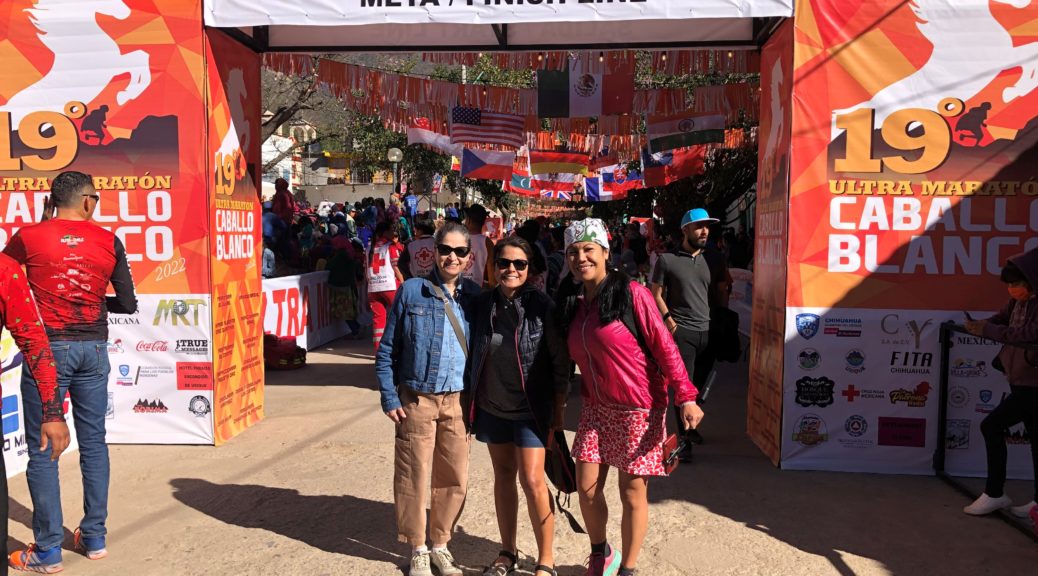The lessons they have learned from the Raramuri people
“Perhaps all our troubles — all the violence, obesity, illness, depression, and greed we can’t overcome — began when we stopped living as Running People. Deny your nature, and it will erupt in some other, uglier way.” — Christopher McDougall
Meet Sacramento residents Lorena Van Rein, Norma Faubert, and Martha Rodriquez who have completed the famous Ultra Maratón Caballo Blanco on March 6th, 2022, a race that was first started by Micah True, whose nickname was El Caballo Blanco (the white horse) for runners from all over the world to run and experience.
True was fond of saying, “While they are at war, we come together to make peace here in the bottom of the canyon,” which cannot be more meaningful and powerful nowadays in the fight against the Coronavirus and the Ukrainian war. True fought against the Mexican drug cartel to maintain peace in the region.
After the book Born to Run by Christopher McDougall came out, runners from all over the world descended upon the town of Urique, Chihuaha, Mexico to experience the mystique of the Caballo Blanco ultra marathon. Norma Faubert is one of the runners who has dreamed of doing this race and running with the Tarahumaras people. An endurance athlete originally from Mexico City, Faubert is a middle school Spanish teacher and a mother of a 14-year-old son.
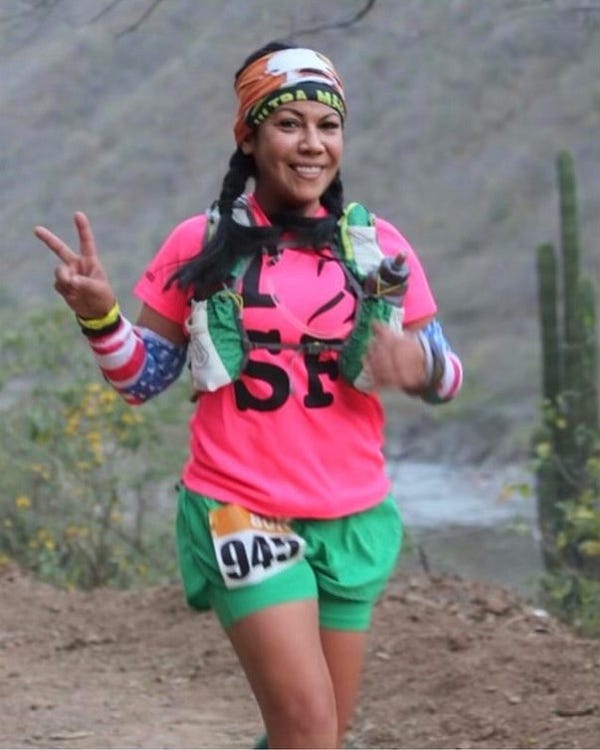
This year, for instance, runners ran next to over 600 Raramuri people on a hot day with temperatures in the 80s, which to Van Rein felt like 100 degrees. The Tarahumara people, or Raramuri, are indigenous people of the Americas. Raramuri means “runners on foot” or “those who run fast.”
Their strength comes from their ability to run in huaraches, their traditional form of sandals, or what US minimalist running circles call Tarahumara sandals, for 200 miles (320Km) over a period of two days through their rough canyon country for inter-village communication, transportation, and hunting.
Lessons learned from running the Ultra Maratón Caballo Blanco
“Just move your legs. Because if you don’t think you were born to run, you’re not only denying history. You’re denying who you are.” — Christopher McDougall
Van Rein, who first started running in 2013 after one of her best friends invited her to run, has completed 16 marathons, two 100-mile races, and many other races. She mainly runs to socialize with other people and to challenge herself. As the co-owner of Wild Rooster Restaurant, a family Mexican restaurant that serves delicious and fresh meals (I eat there often whenever I am in the mood for a burrito), Van Rein was excited to have completed the marathon this year after two years of the pandemic when races were put on hold.
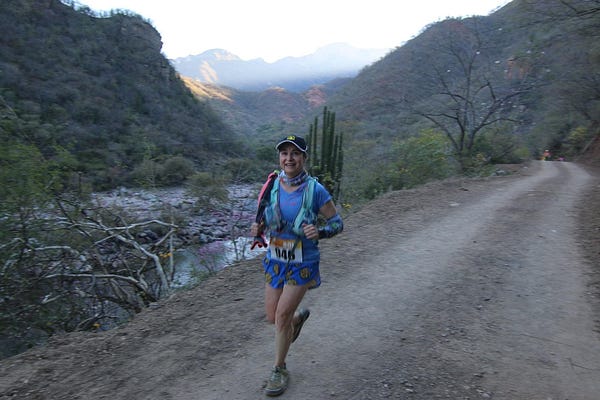
“This event is a very unique race not only because you have to fly to this destination, but there is also another 12 more hours spent driving to Urique, where the event took place,” said Van Rein. “Roads are not easy to drive, but the views on the way to get there are impressive that no pictures give them justice.”
After meeting the Ramirez Family (Maria Lorena Ramirez finished second female overall in the 80Km), Van Rein knew that running the Ultra Maratón Caballo Blanco had to be on her bucket list.
Her heart was full of joy for having completed this difficult but beautiful ultramarathon because she had experienced the rugged beauty and splendor of Copper Canyon, a whopping four times larger than the Grand Canyon with a depth of over a mile. The canyon rim sits at an altitude of 8,000 ft and is full of rocky outcrops and sheer drop-offs.
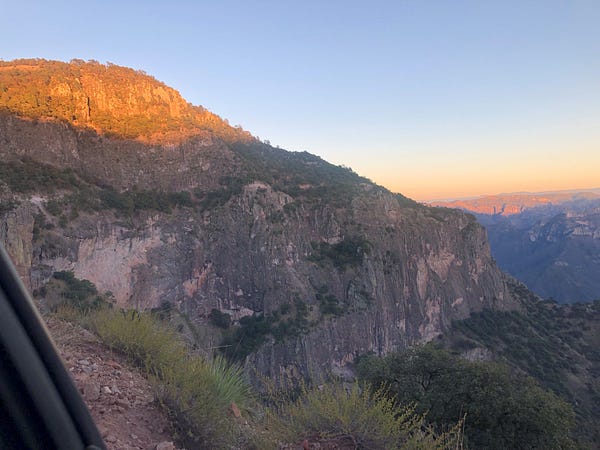
Running as a way of life
It doesn’t matter whether you’re the lion or a gazelle-when the sun comes up, you’d better be running.” — Christopher McDougall
Van Rein said that running this race was a hobby for her, whereas for the Raramuri people, running and walking everywhere is their way of life. They do it naturally without thinking about it, and the distances are pretty far. For instance, kids who need to get to school from the village need to run/walk for about three hours each way, which is why not everyone can go to school. For example, in the Ramirez Family, only the two older brothers were able to go to school and because of that, they can speak Spanish. The daughters couldn’t go, as they needed to stay home and help with the daily chores.
Faubert added: “The Raramuri people live in a remote place. It’s not uncommon to just run over to see a friend … And that might be 10–20 miles away.” Imagine having to run that long to see your friends, which shows us that we have no excuses for making and maintaining those important human connections.
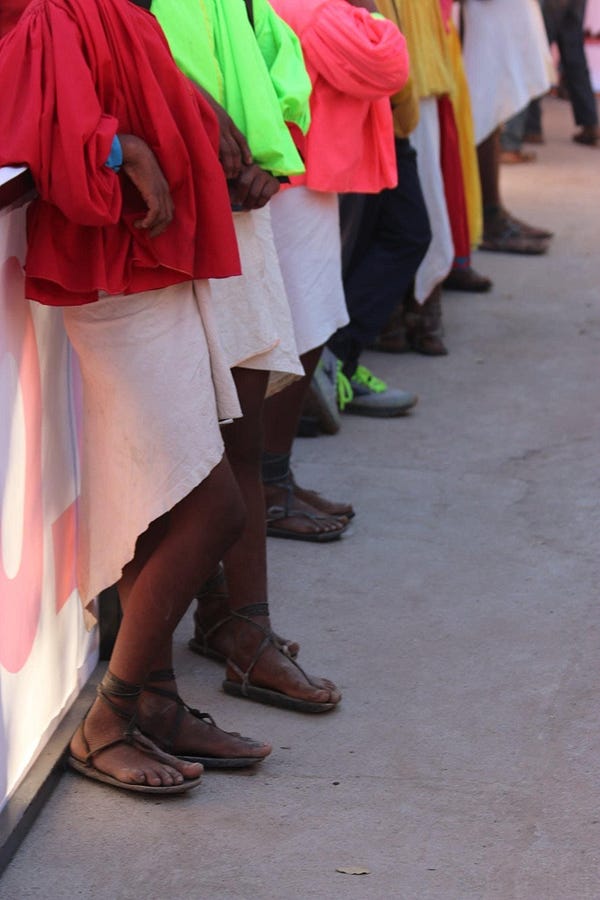
Kindness and trust are given openly and freely
“The reason we race isn’t so much to beat each other, but to be with each other.” — Christopher McDougall“
People were nice, polite, humble, and so welcoming to everyone,” Van Rein remarked. They were also trustful when she asked for coffee. They told her to go ahead take the coffee and pay later.
Being surrounded by these kind people has taught Van Rein that we can learn to trust one another and offer simple gestures of kindness, such as a warm cup of coffee. Not only did Van Rein enjoy the race, but she also made many friends with whom she chats every day online.
Van Rein was also impressed how well she did drinking Pinole served at the aid stations ( a drink made from corn and the powder mixed in the water). For inspiring, homemade, and wholesome pinole cookies and oatmeal, check out some recipes here. The aid stations also served oranges, bananas, bottles of water, and tortillas with beans, which ran out by the time she got there.
The necessity of running for food
“You don’t stop running because you get old, you get old because you stop running.” — Christopher McDougall
According to Van Rein, hundreds of Raramuri people of all ages — some of them in their 70s and 80s run the 80K distance because they receive a voucher to exchange food worth $350 Pesos about $17.50 dollars. “Unlike me, they could not run only the 42Km (26.2 miles); they had to run the 50 miles to receive food, which is why everyone wants to finish the race regardless of how long it takes,” Van Rein clarified.
Faubert also felt transfixed and transformed by this race.“The Raramuri people proved that we all have reservoirs of strength and untapped potential inside us,” Faubert said.
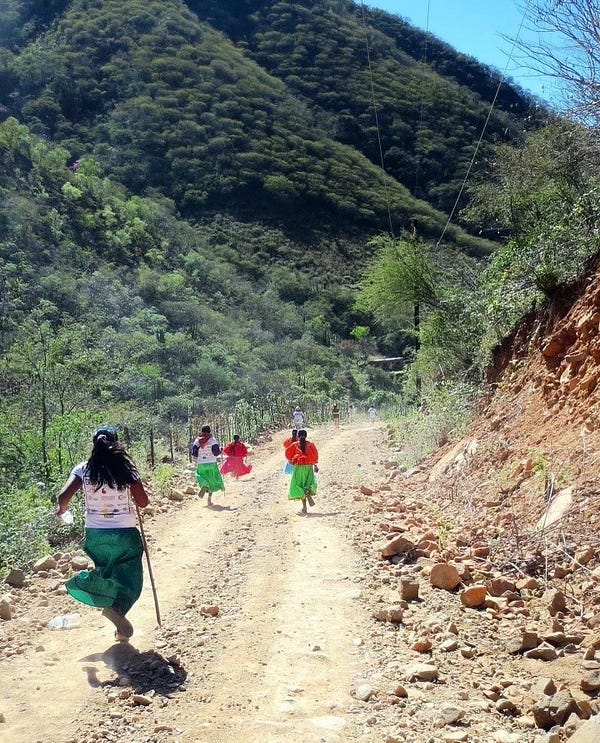
Although Van Rein has done many hard races, the Ultra Maratón Caballo Blanco would always be in her heart because she had a running epiphany during this event:
“While my running is simply a hobby, the Raramuri people run for food,” Van Rein said. “I totally recommend this race. You will leave part of your heart there.”
Final Takeaways
Besides being born to run, we cannot let the simple joys of movement and freedom ever escape from us. When we run with other people, we learn to forge deeper and more meaningful relationships, which I hope will transcend any unnecessary destructive acts against one another. I also pray that we will all learn to make peace in the bottom of the canyon, as Micah True said, or wherever we are in the world.
For more inspiration on how to let “AIR,” which stands for adaptation, inspiration, and resilience guide and uplift you during these uncertain and crazy times, please consider buying my print edition or e-book The PR- The Poetics of Running, A Book of Poetry in Motion and Morsels of Love on Amazon, or buy it straight from my blog by clicking on my books link, which will take you to Amazon.
For more info on running and real estate, whether buying or selling, please e-mail me at carmenmicsa@yahoo.com, or call me at 916-342-2446. Also mention this blog and receive a great offer whether buying (credit for closing costs) or selling (commission discount). Running for real estate with joy!

